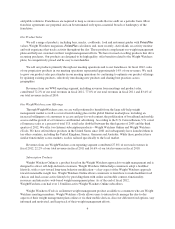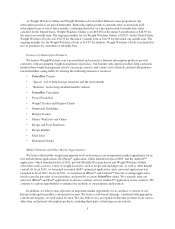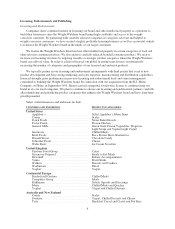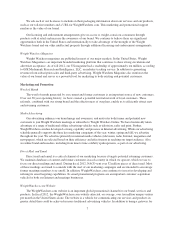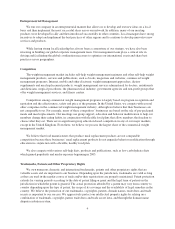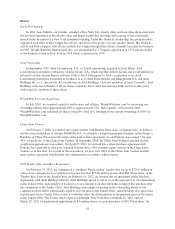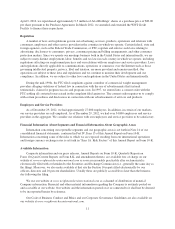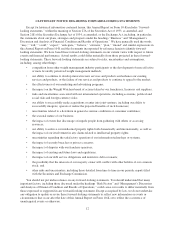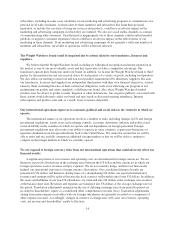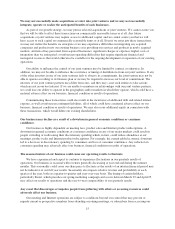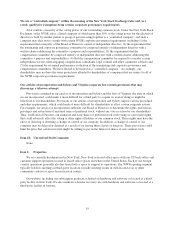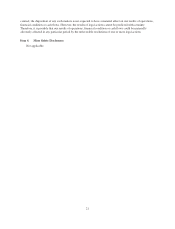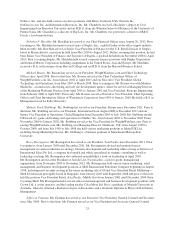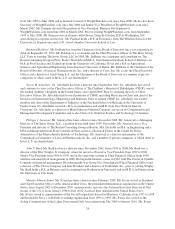WeightWatchers 2012 Annual Report Download - page 30
Download and view the complete annual report
Please find page 30 of the 2012 WeightWatchers annual report below. You can navigate through the pages in the report by either clicking on the pages listed below, or by using the keyword search tool below to find specific information within the annual report.subscribers, including in some cases celebrities, in our marketing and advertising programs to communicate on a
personal level with consumers. Actions taken by these members and subscribers that harm their personal
reputation, or include the cessation of using our services and products, could have an adverse impact on the
marketing and advertising campaigns in which they are featured. We also use social media channels as a means
of communicating with consumers. Unauthorized or inappropriate use of these channels could result in harmful
publicity or negative consumer experience which could have an adverse impact on the effectiveness of our
marketing in these channels. If our marketing and advertising campaigns do not generate a sufficient number of
members and subscribers, our results of operations will be adversely affected.
The Weight Watchers brand could be impaired due to actions taken by our franchisees, licensees and
suppliers.
We believe that the Weight Watchers brand, including its widespread recognition and strong reputation in
the market, is one of our most valuable assets and that it provides us with a competitive advantage. Our
franchisees operate their businesses under our brand. In addition, we license the Weight Watchers brand to third
parties for the manufacture and sale in retail stores by such parties of a variety of goods, including food products.
We also sell in our meeting rooms food and non-food products manufactured by third-party suppliers. Because
our franchisees, licensees and suppliers are independent third parties with their own financial objectives, actions
taken by them, including breaches of their contractual obligations, such as not following our program or not
maintaining our quality and safety standards, could harm our brand. Also, these Weight Watchers-branded
products may be subject to product recalls, litigation or other deficiencies. Any negative publicity associated with
these actions would adversely affect our brand and may result in decreased meeting attendance, Internet
subscriptions and product sales and, as a result, lower revenues and profits.
Our international operations expose us to economic, political and social risks in the countries in which we
operate.
The international nature of our operations involves a number of risks, including changes in US and foreign
government regulations, tariffs, taxes and exchange controls, economic downturns, inflation and political and
social instability in the countries in which we operate and our dependence on foreign personnel. Foreign
government regulations may also restrict our ability to operate in some countries, acquire new businesses or
repatriate dividends from foreign subsidiaries back to the United States. We cannot be certain that we will be
able to enter and successfully compete in additional foreign markets or that we will be able to continue to
compete in the foreign markets in which we currently operate.
We are exposed to foreign currency risks from our international operations that could adversely affect our
financial results.
A significant portion of our revenues and operating costs are denominated in foreign currencies. We are
therefore exposed to fluctuations in the exchange rates between the US dollar and the currencies in which our
foreign operations receive revenues and pay expenses. We do not currently hedge, and have not historically
hedged, our operational exposure to foreign currency fluctuations. Our consolidated financial results are
presented in US dollars and therefore, during times of a strengthening US dollar, our reported international
revenues and earnings will be reduced because the local currency will translate into fewer US dollars. In addition,
the assets and liabilities of our non-US subsidiaries are translated into US dollars at the exchange rates in effect
at the balance sheet date. Revenues and expenses are translated into US dollars at the average exchange rate for
the period. Translation adjustments arising from the use of differing exchange rates from period to period are
recorded in shareholders’ equity as accumulated other comprehensive income (loss). Translation adjustments
arising from intercompany receivables with our foreign subsidiaries are generally recorded as a component of
other expense (income). Accordingly, changes in currency exchange rates will cause our revenues, operating
costs, net income and shareholders’ equity to fluctuate.
14


